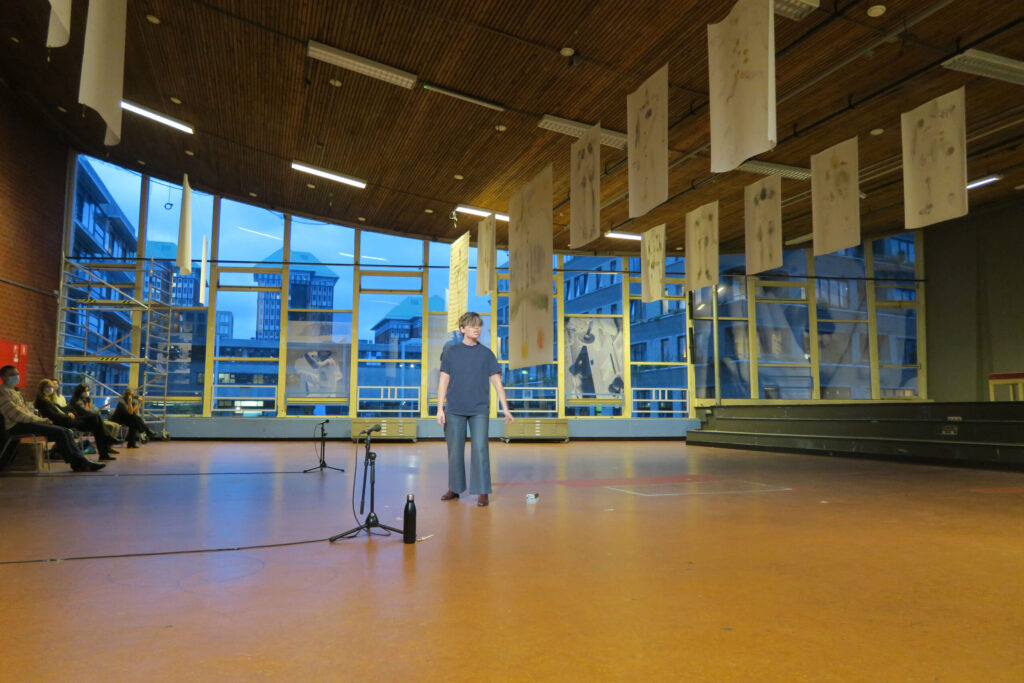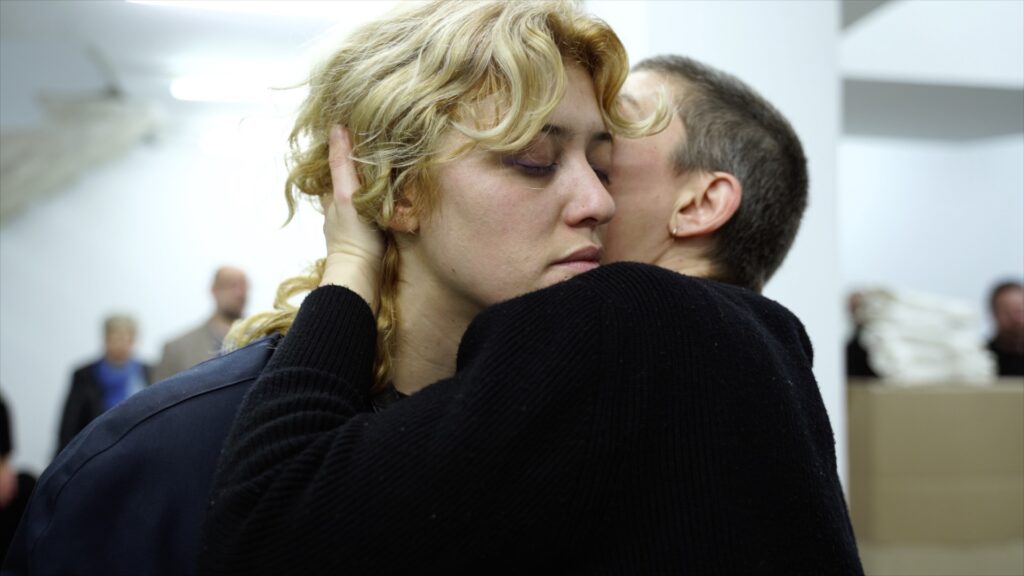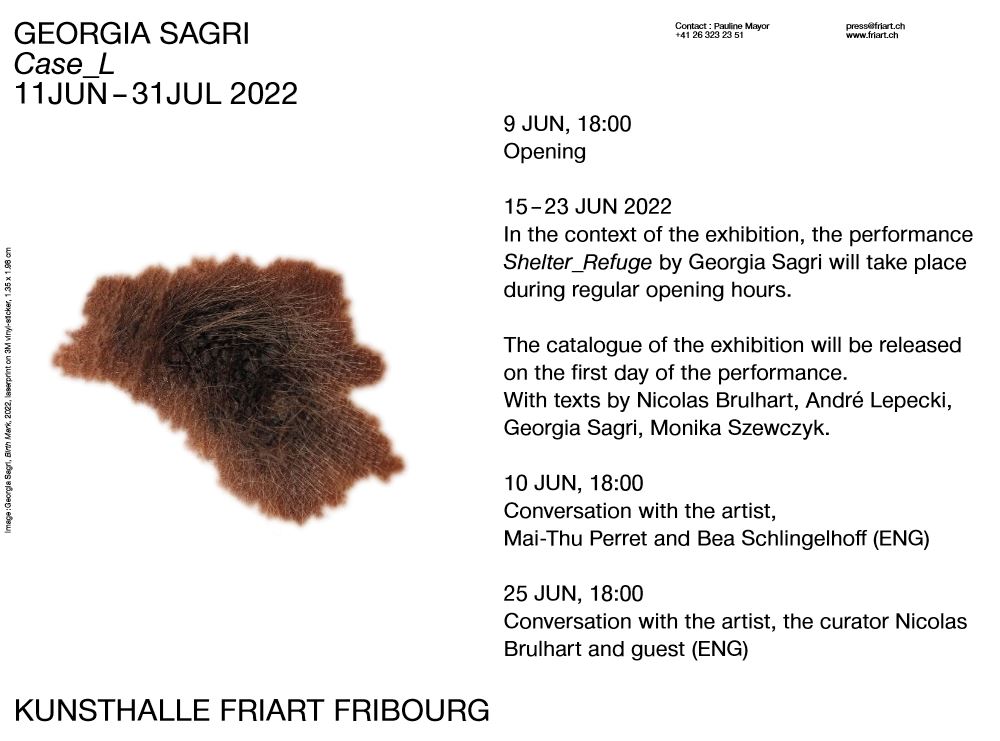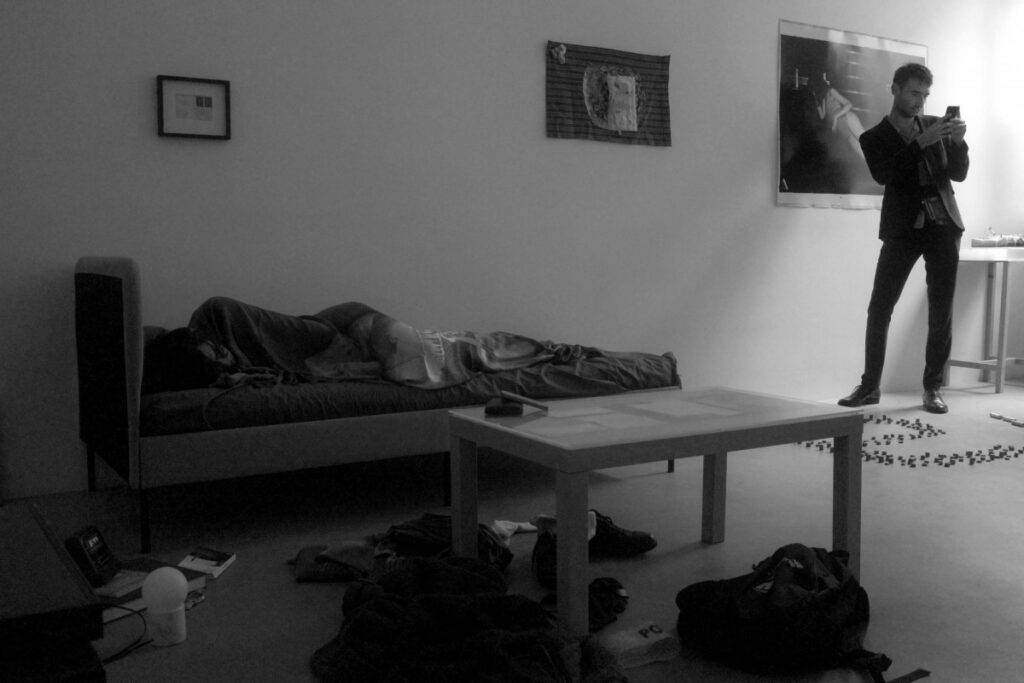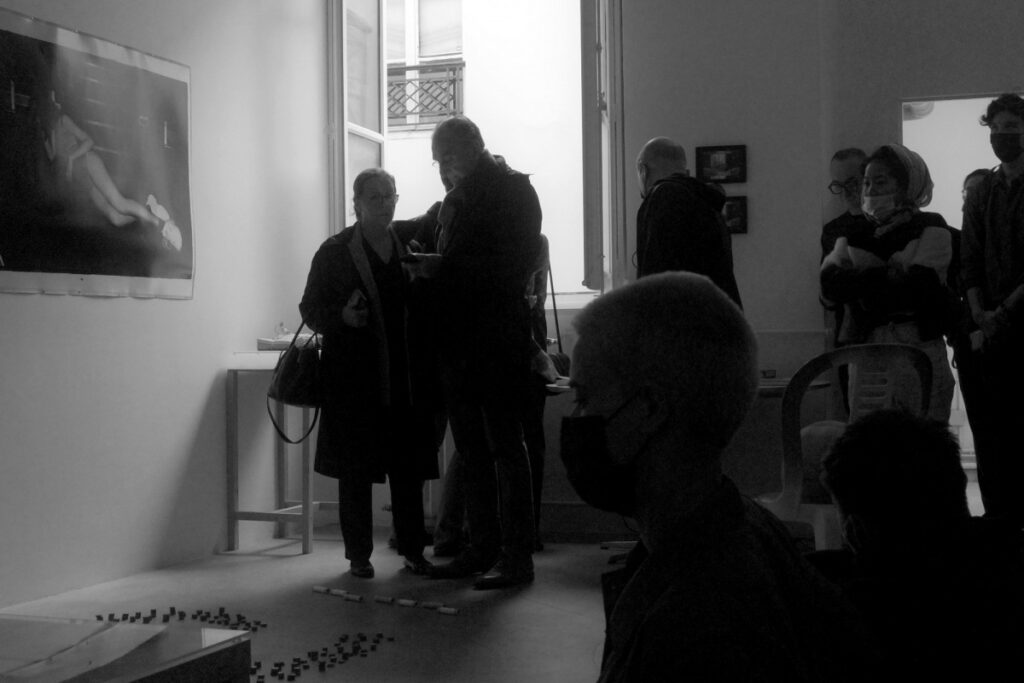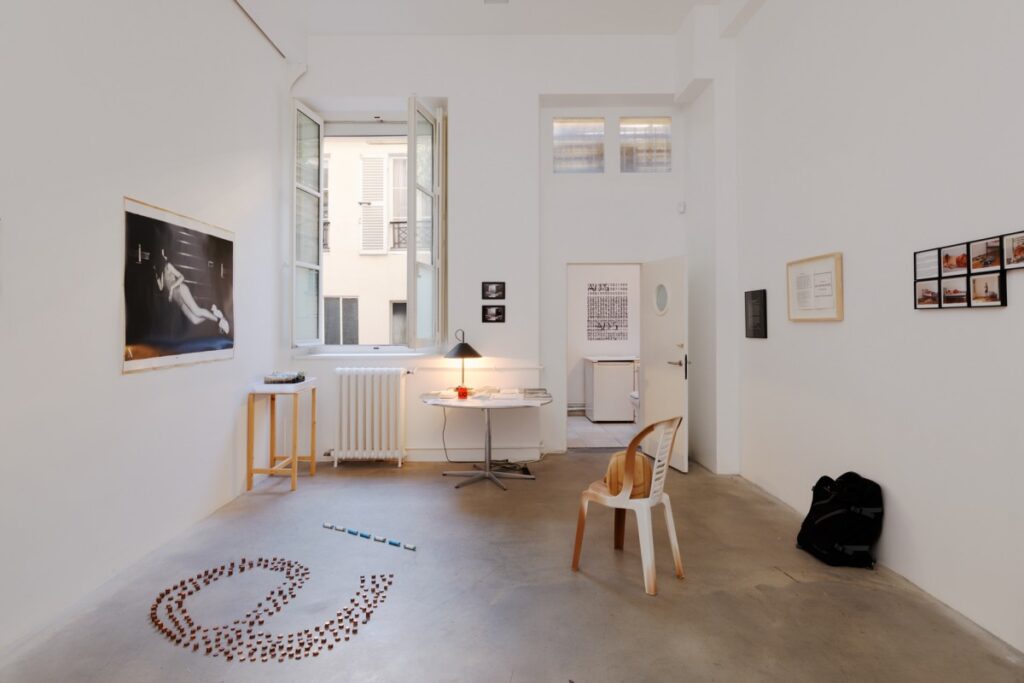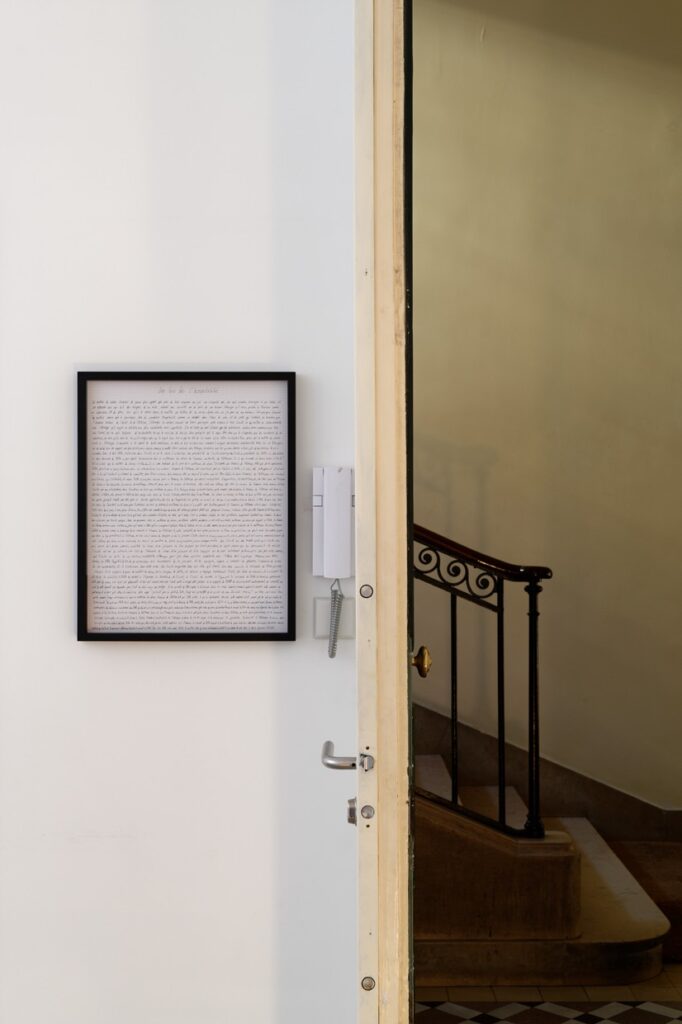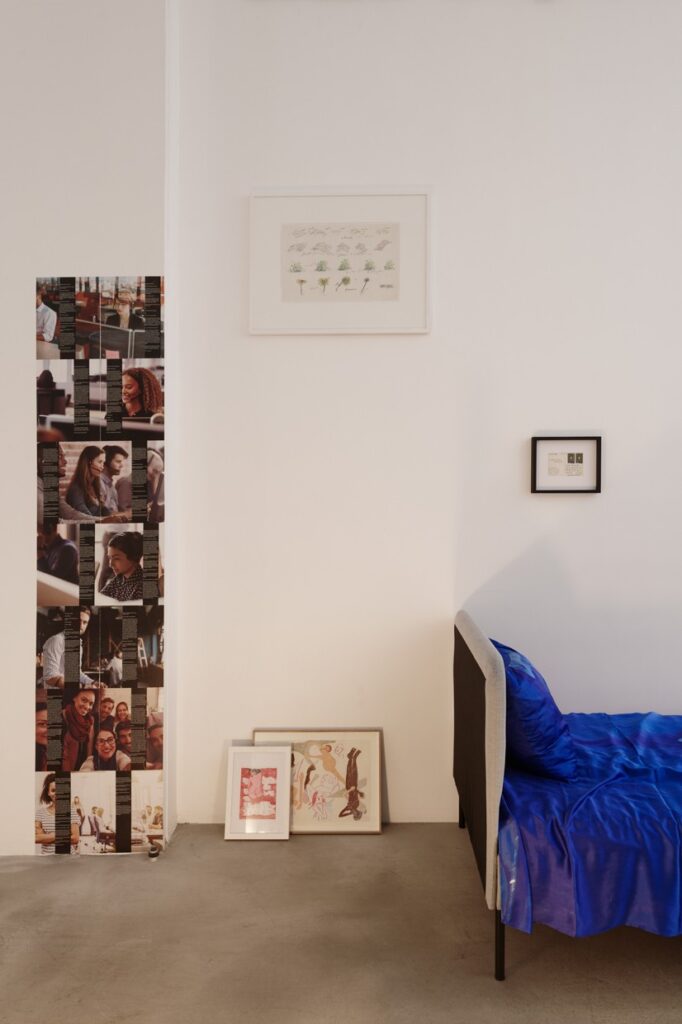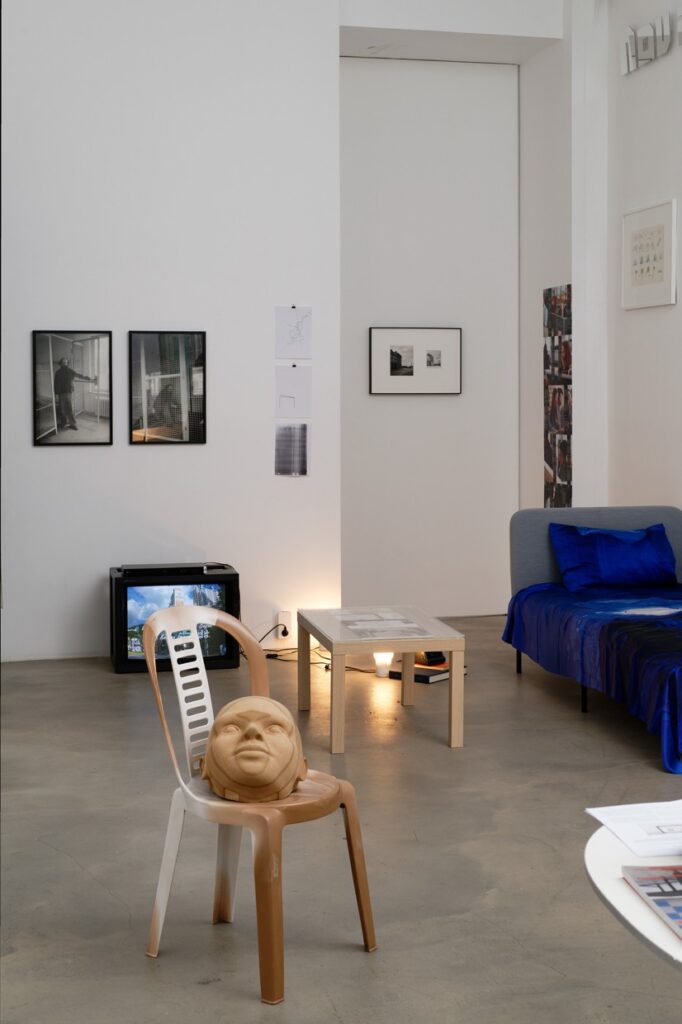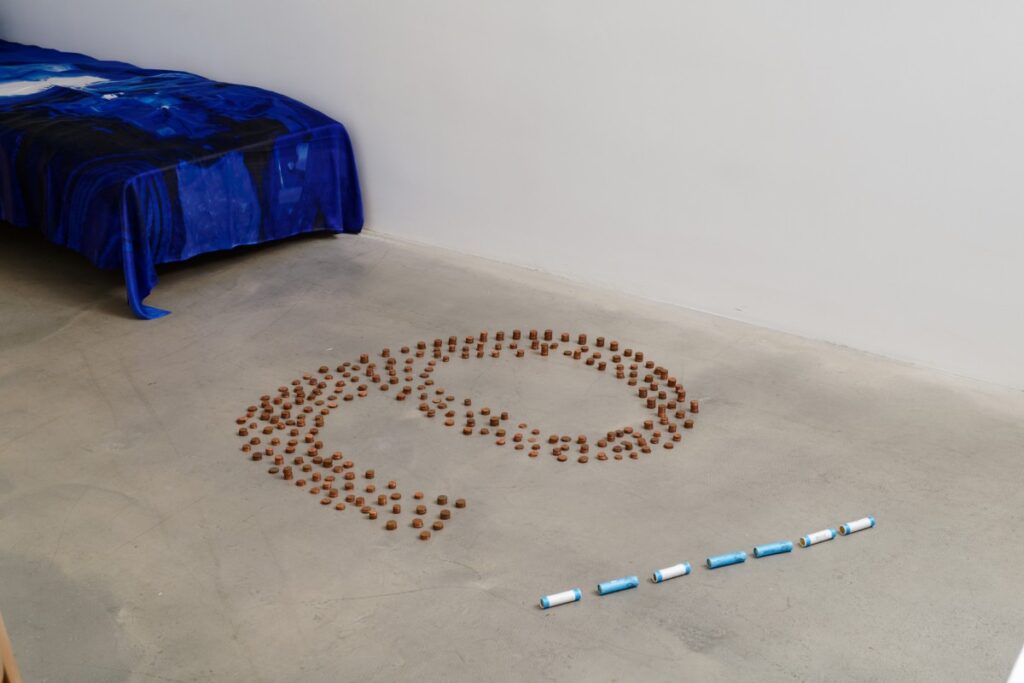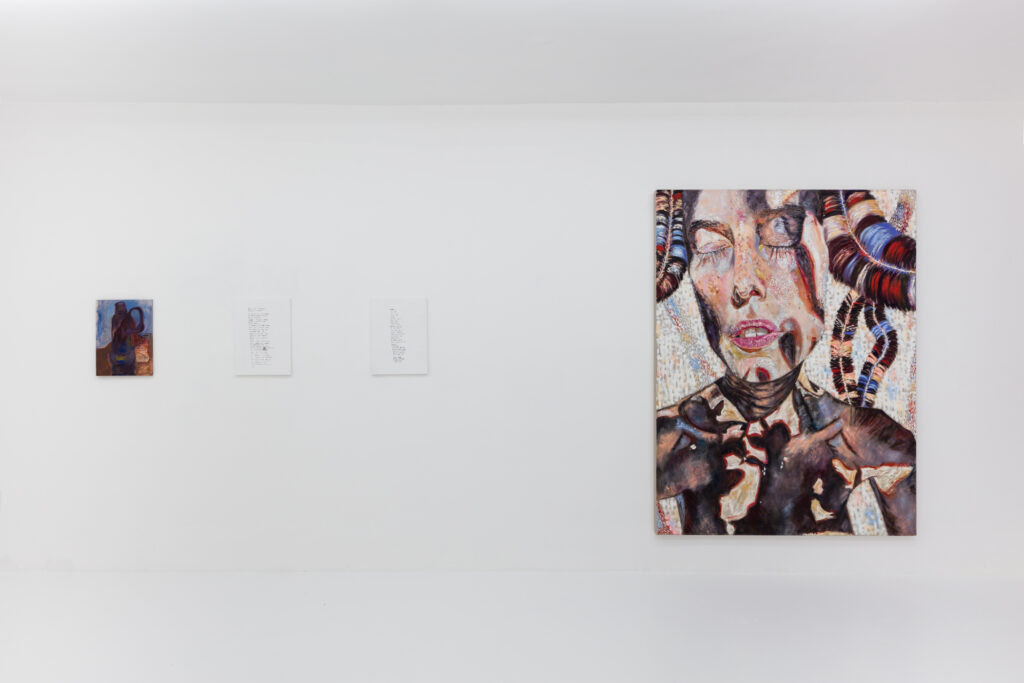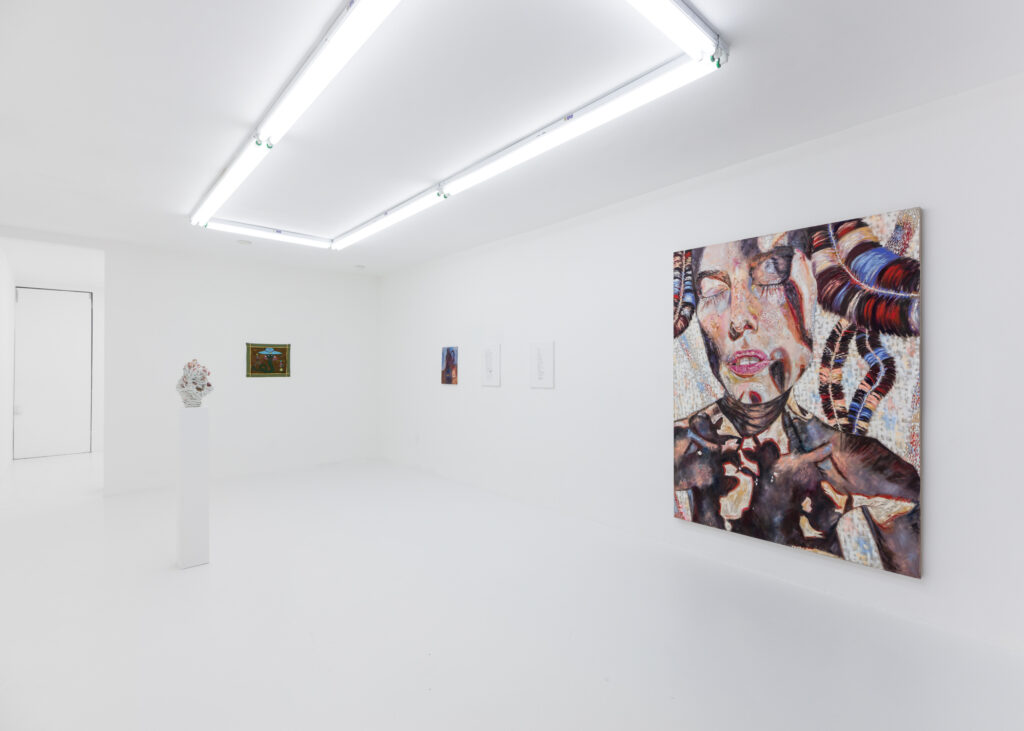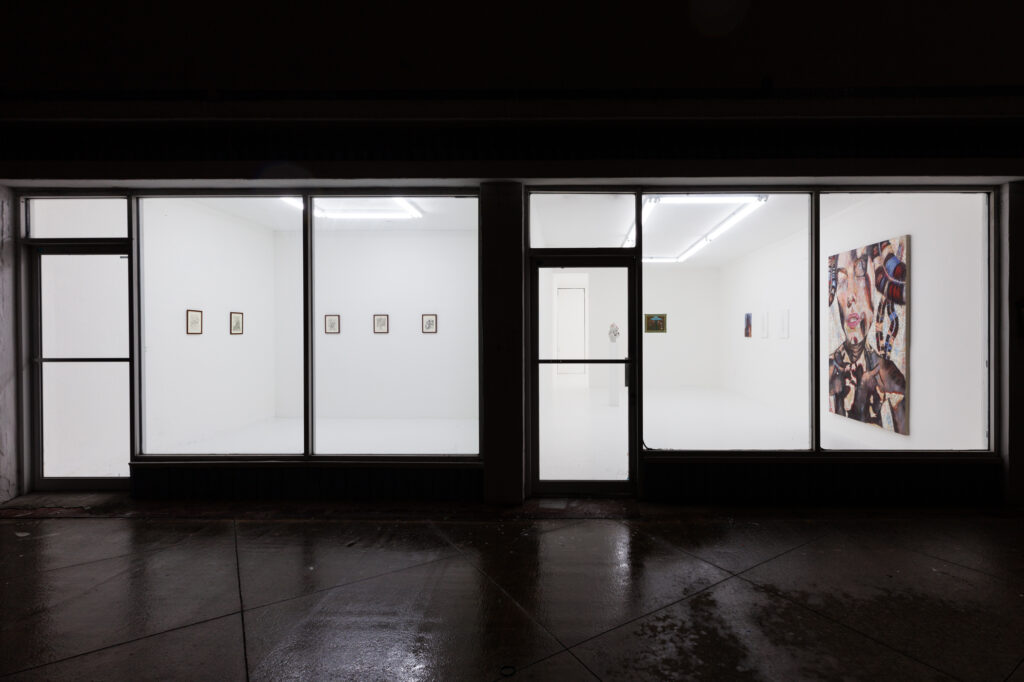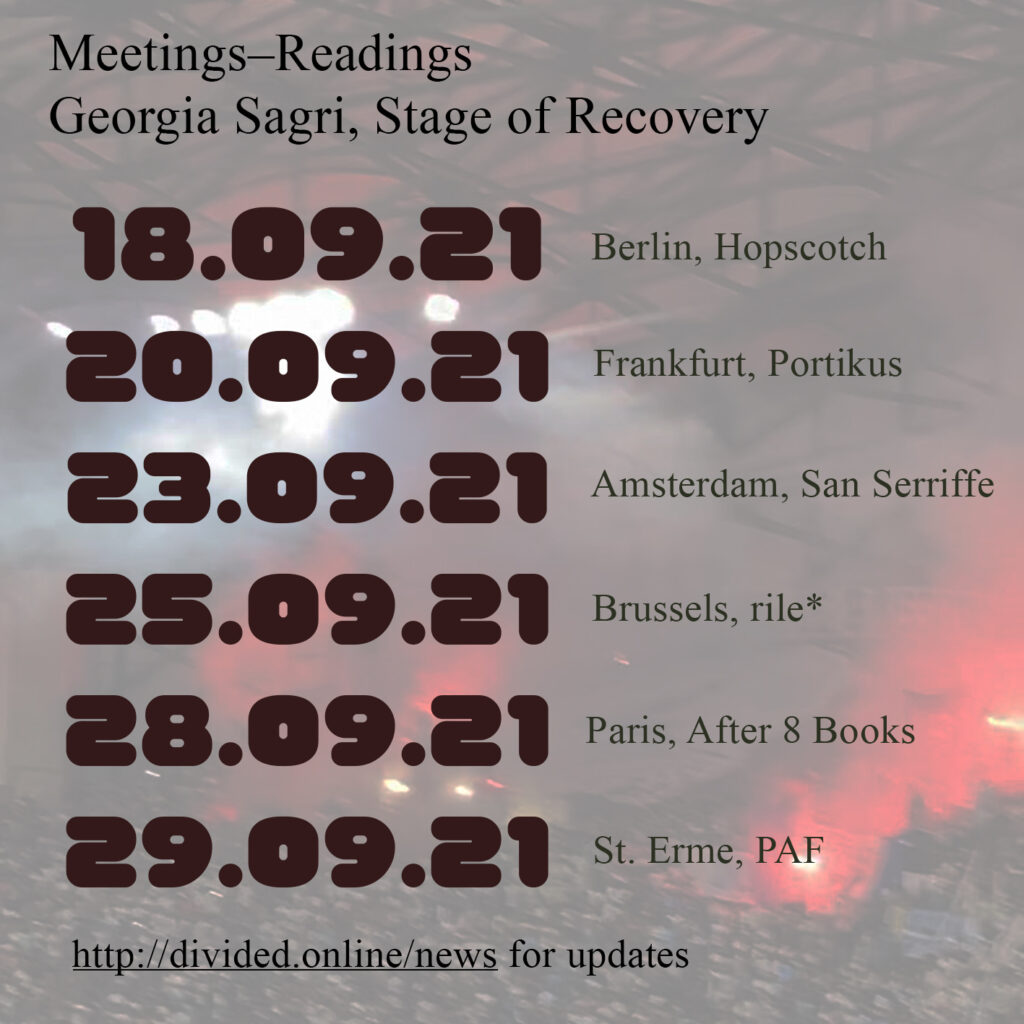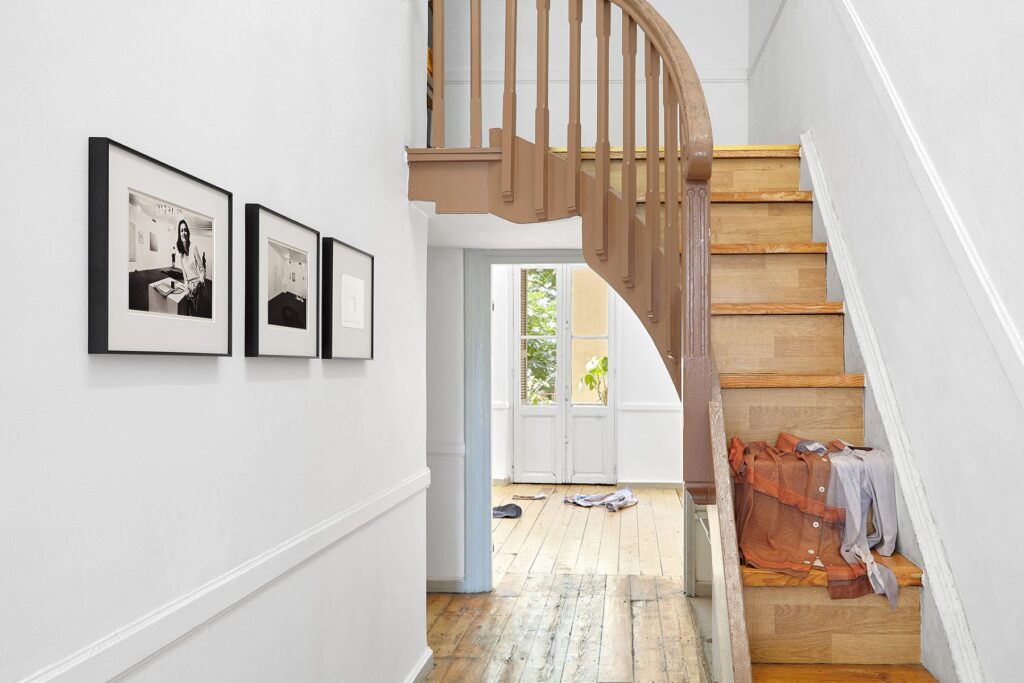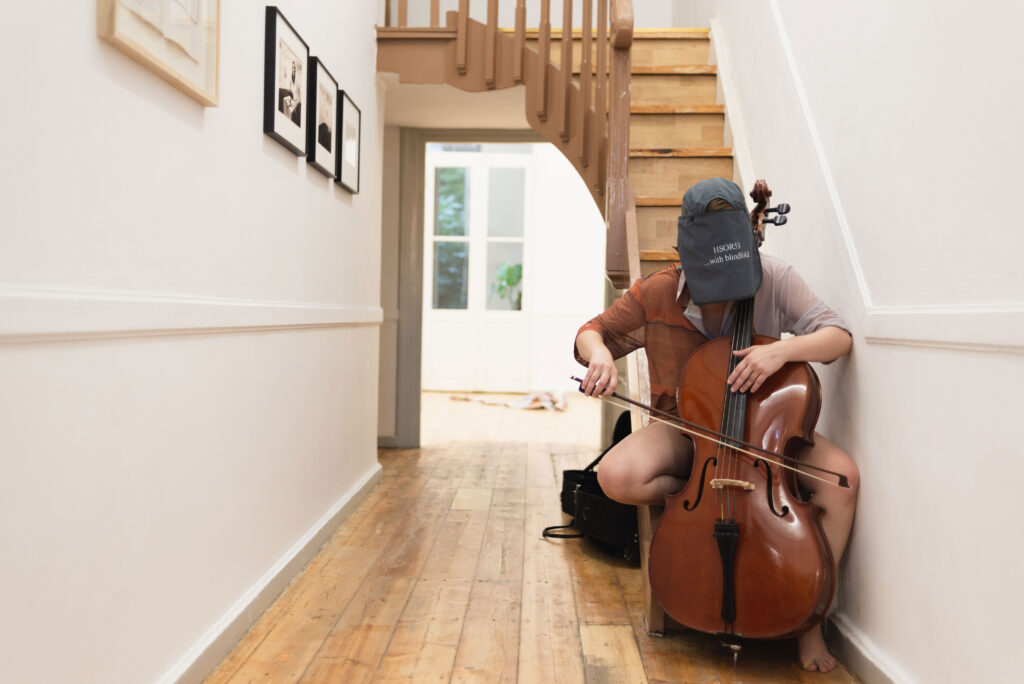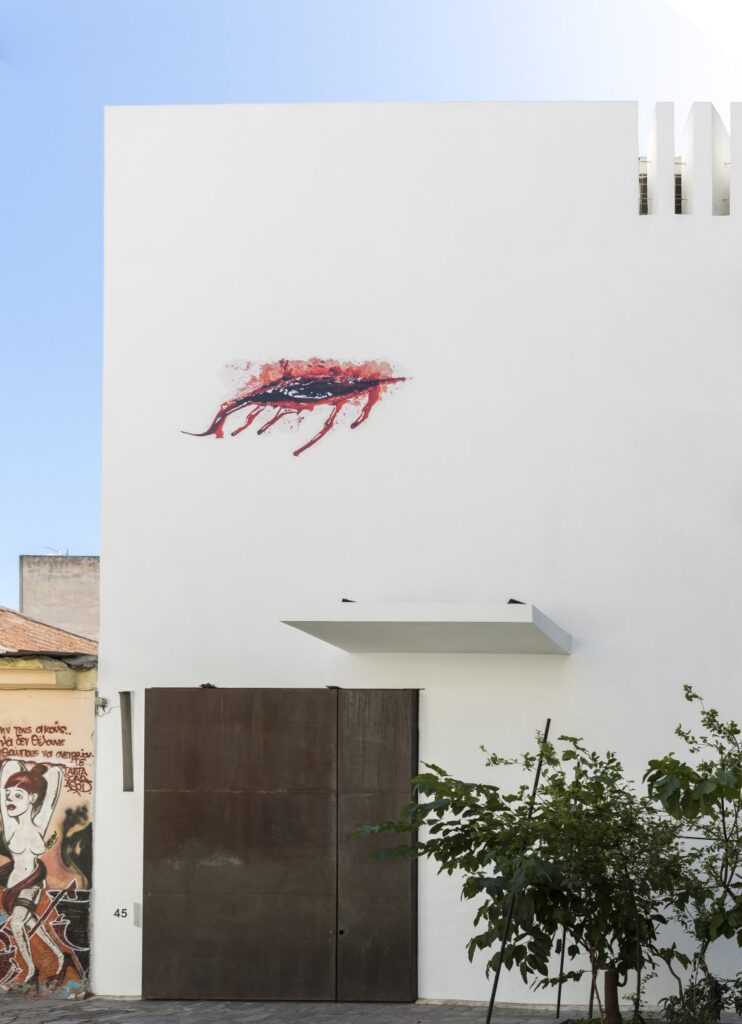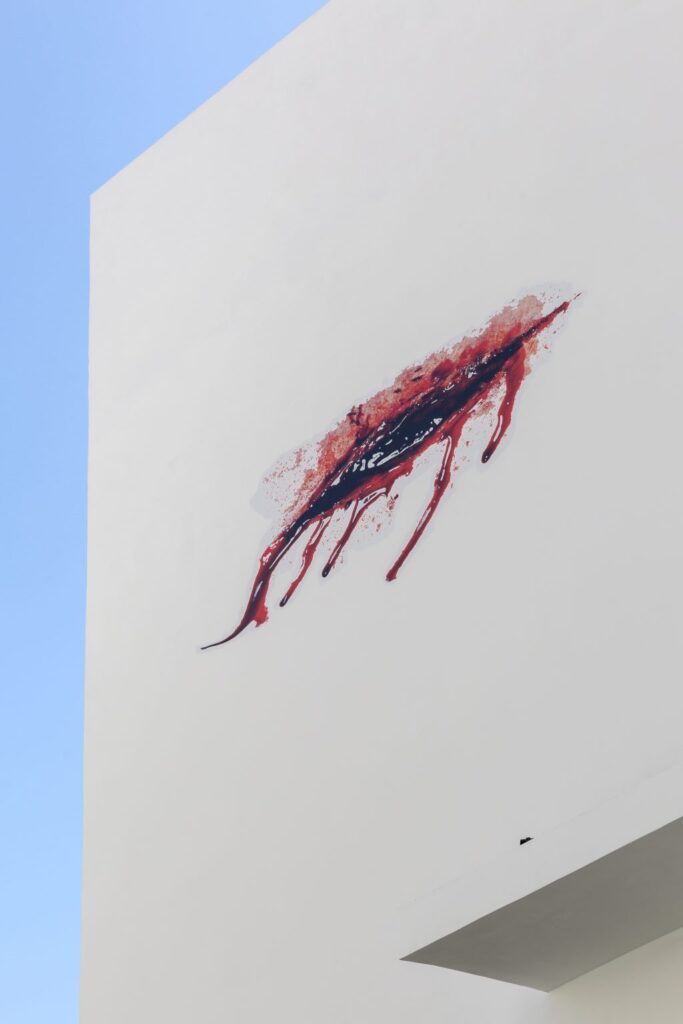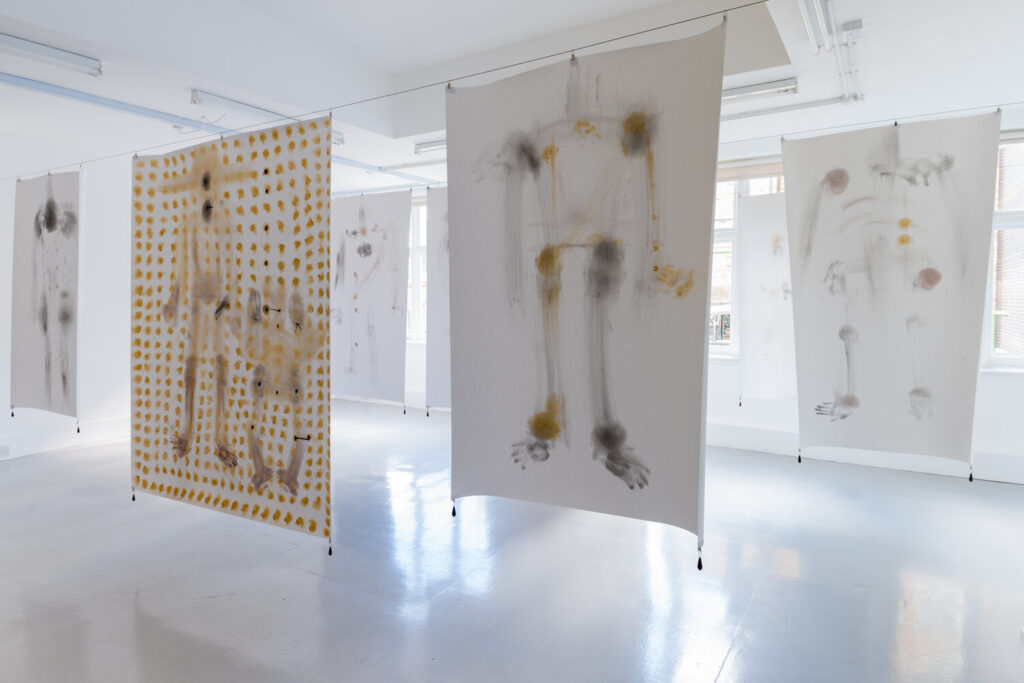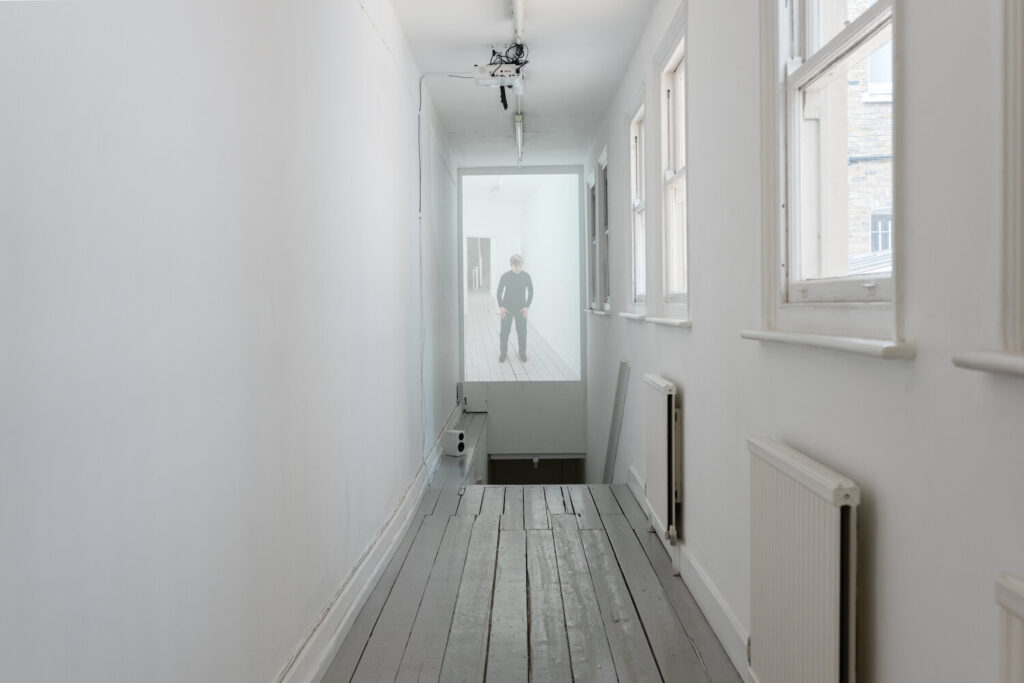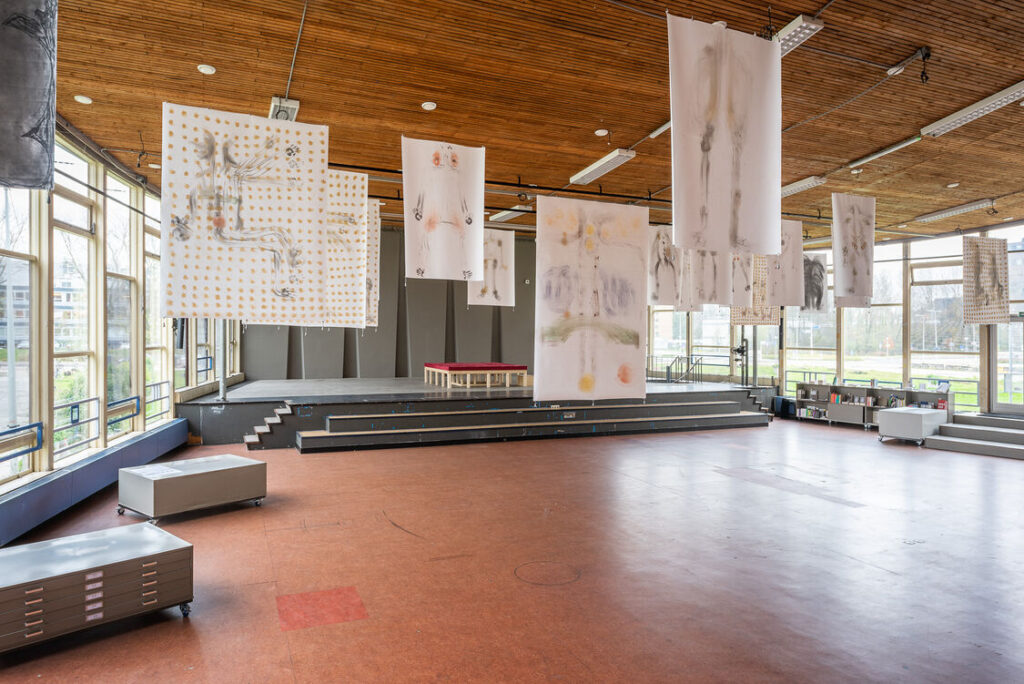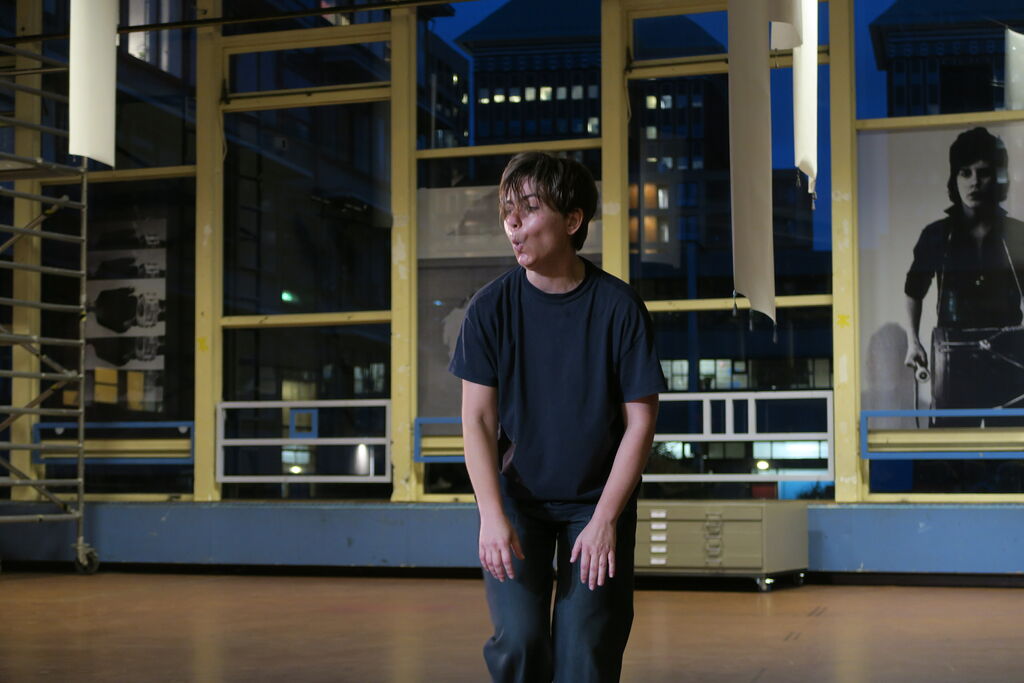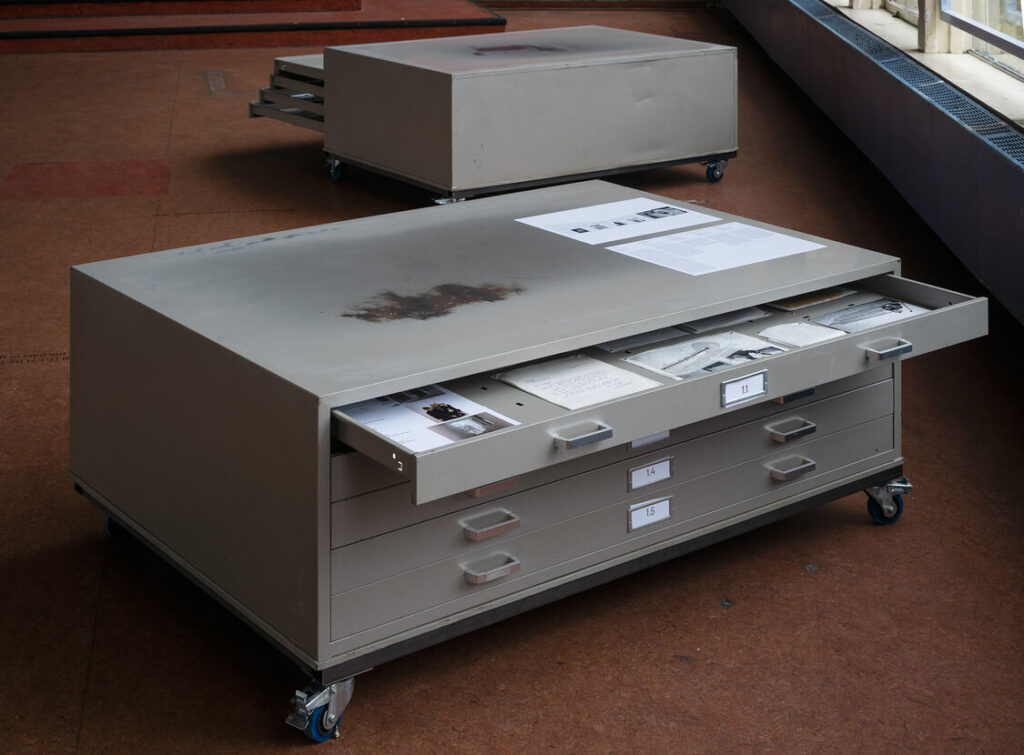Kyiv Biennial 2023
↓OCTOBER 17–DECEMBER 17, 2023
Georgia Sagri participates in the main exhibition of Kyiv Biennial 2023, with two performance pieces, Deep Listening (2001) and Breathing 7_1_7 with Embryac Position / Sunset which will perform on the opening day of the Biennial as well as with the work Deep Cut which will be installed in the main exhibition venue.
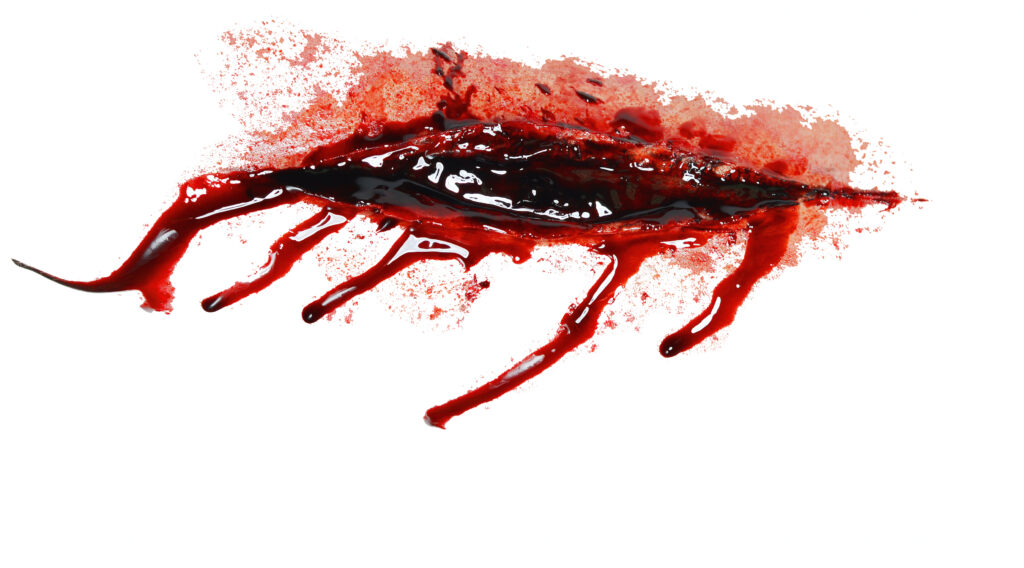
Parcours at ArtBasel
↓JUNE 15 – JUNE 18 2023
ART BASEL PARCOURS
curated by Samuel
Deep Cut, 2018
15-18 June 2023
Deep Listening (2001), 2023
Performance by Georgia Sagri
Duration: 20 min
Friday, June 16, 4pm , Saturday, June 17, 7:30pm
Münsterplatz, Basel
we tell ourselves stories in order to live at Callirrhoë
↓FEBRUARY 17 – MARCH 11 2023
With works by Eva Anerrapsi, Maria F Dolores, Anastasia Douka, Dora Economou, Selma Köran, Irini Miga, Rallou Panagiotou, Nina Papaconstantinou, Natasha Papadopoulou, Nana Sachini, Georgia Sagri, Beate Scheder, Sofia Touboura, Marina Velisioti, Kyveli Zoi and 1992 (Ioanna Mitza & Pegy Zali); codependent curatorial by Xenia Kalpaktsoglou and Olympia Tzortzi
“And all of a sudden I was taking my friend to the hospital. My friend smiled at me, put her fist in the air, and entered through the glass door. My friend is a very strong person. My friend is a fighter. My friend is Beate and this is dedicated to her.”
In the frame of a circle of friendship, nineteen femininities come together to address the notion of receiving and providing care in order to survive in environments that challenge their very existence. Going beyond the fixed notion of the family and the recent commodification of wellness via life coaching and individualist self-care app trends, they focus on affectivity, solidarity, relationality and interdependence over charity, self-indulgence, self-preservation and resilience. They push back against disadvantages by bringing forward vulnerability and codependence, as ways to go through the world with one another, in a spirit of radical kinship and hope.
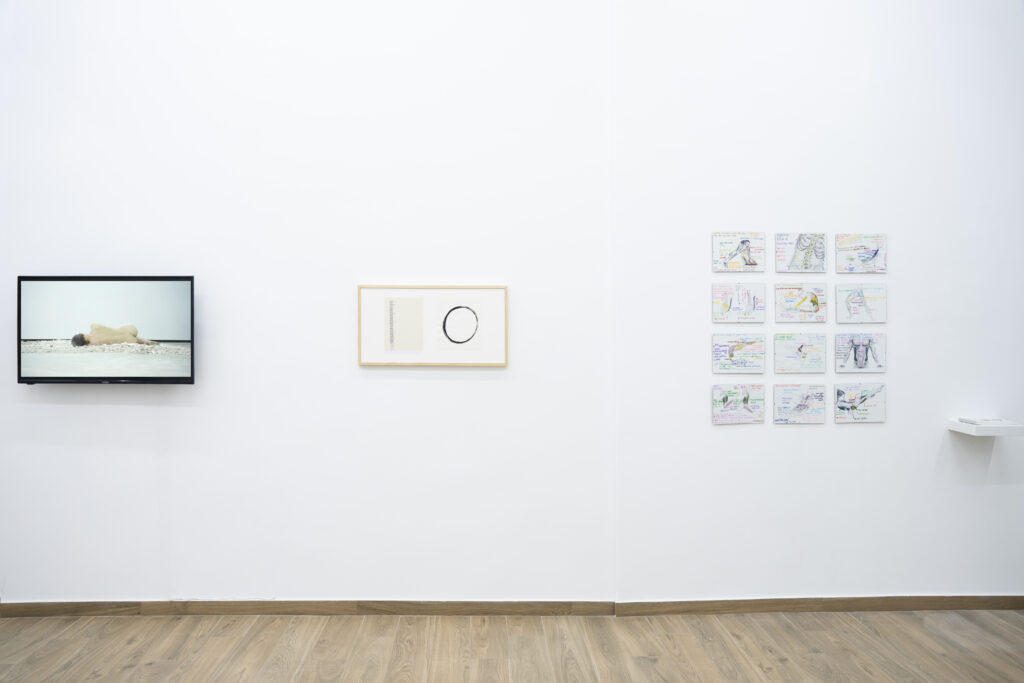
UNEGO at Ulrik Gallery, New York
↓FEBRUARY 04 – MARCH 25 2023
Painting is touch, therefore my paintings are treatments.
-Georgia Sagri
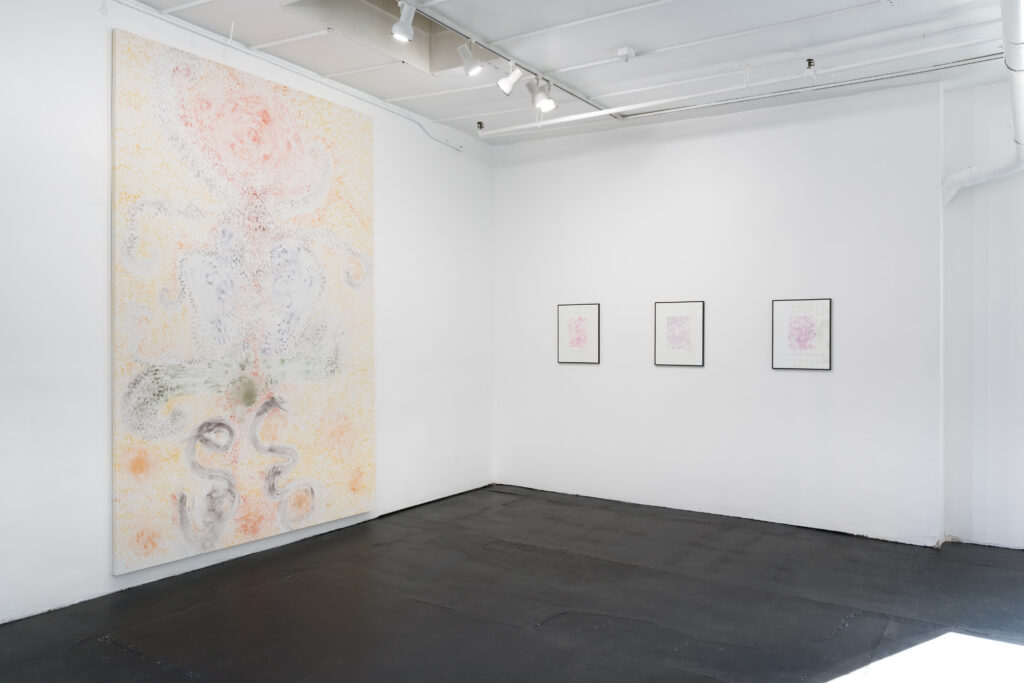
Oikonomia at The Breeder Gallery
↓JANUARY 12 2023 – FEBRUARY 5 2023
For her solo exhibition Oikonomia at the Breeder, IASI (recovery) is practiced onto her own works. Sagri narrows her attention on the reorganization of practices, materials, and objects that have been produced and presented in the past – that share common qualities: most were damaged and retrieved from the art circulation, reaching a state of vanishing. Some were damaged while being exhibited, others by being used in performance works or being displayed in public space, or were destroyed due to mistreatment, during deinstallation and transportation. The exhibition includes three performances, which are also currently in a state of invisibility because they were never documented. Part of their recovery is the search for testimonies and archival fragments, on the basis of which the artist reconstructs the performances, remembers them, and mnemonically re-enacts them.
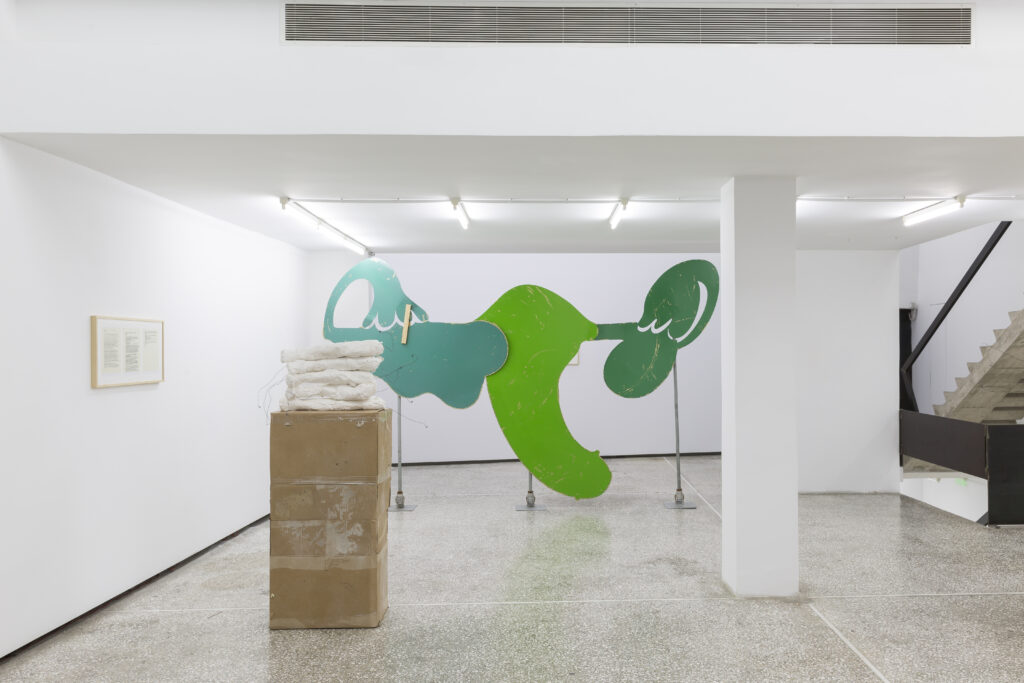
Le Grand désenvoûtement Chapitre 1 at Palais de Tokyo
↓DECEMBER 2022
As part of Le Grand désenvoûtement [Spiritual Healing], Georgia Sagri presents a selection of drawings from this process of autonomous self-care. Over the course of the session, volunteers take up position on a stage covered in mattress. The exercises of diaphragm vibration that the artist proposes enables them to observe and localize within their bodies the pains that are symptoms of contemporary lifestyles and social and professional injunctions. Drawing is one tool used by the artist in this process for identifying pain. Through their titles and their visual cues, the drawings presented in this exhibition, which were created in 2020, individually attest to collective ills which enter into resonance here with the reality of a cultural institution that is also a possible pool of more or less unconscious pathologies.
Elsewhere, Georgia Sagri links these cartographies of pain to an incisive analysis of the art field through a reading of texts from her collection Stage of Recovery (Divided Publishing, 2021), which will take place on Friday 9 December at 6PM.
RECOVERY at Central Fine
↓SEPTEMBER – OCTOBER 2022
Pain must be acknowledged to be followed: not as a neglected code, that for centuries has been demonised, but as a bell and a compass of the unique conditions of our actual internal states, behaviours, and affairs. When we listen through pain, there is the promise of change.
– Georgia Sagri
The exploration of performance lies at the center of Georgia Sagri’s work. The artist has developed a practice of care she terms IASI, in reference to the Greek word ίαση for recovery. This was born out of her need to prepare and recuperate from demanding performance pieces. IASI has since shifted into ongoing research on conditions like insomnia or fatigue, which Sagri calls “performance pathologies”. With IASI, the artist invites participants onto her Stage of Recovery, a bed-like frame upholstered with soft cushions, for individual sessions. Οn this stage, she guides participants through time-pacing, breathing, voice tuning, and self-developed motion techniques in which air is the main element.
Sagri methodically records these sessions as charcoal and coloured chalk drawings on paper, which she describes as “affective anatomies”. Dots, shapes, and converging lines indicate zones of tension, release, and the general feeling of a session towards recovery.
At CENTRAL FINE, these affective anatomies will float, letting air pass between them, anchored by weights, as ghosts that register something that marked us, and the presence of what changes.
« …No one talks about the present. There is one, and I feel it now with you. It is my only weapon. The present is that a group of friends are in a circle, here, and we are capable of doing anything we want, now. There is no convenience of belonging, only the presence of our bodies here and now, and the decision to do is the only thing we have… »
« …There is no minute left for discussion planning or explanation. It is clear that the urgency of us doing is more important than the articulation of definitions or meaning… »
YOYI! Care, Repair, Heal at Gropius Bau
↓SEPTEMBER 2022 – JANUARY 2023
Featuring the diverse and sometimes conflicting perspectives of 26 artists, YOYI! Care, Repair, Heal addresses issues such as the politics of health, the resilience of Indigenous knowledge systems, forms of kinship, fair land use and its distribution, decoloniality, and the rights of the non-human, all entangled with various concepts of care, repair, and healing.
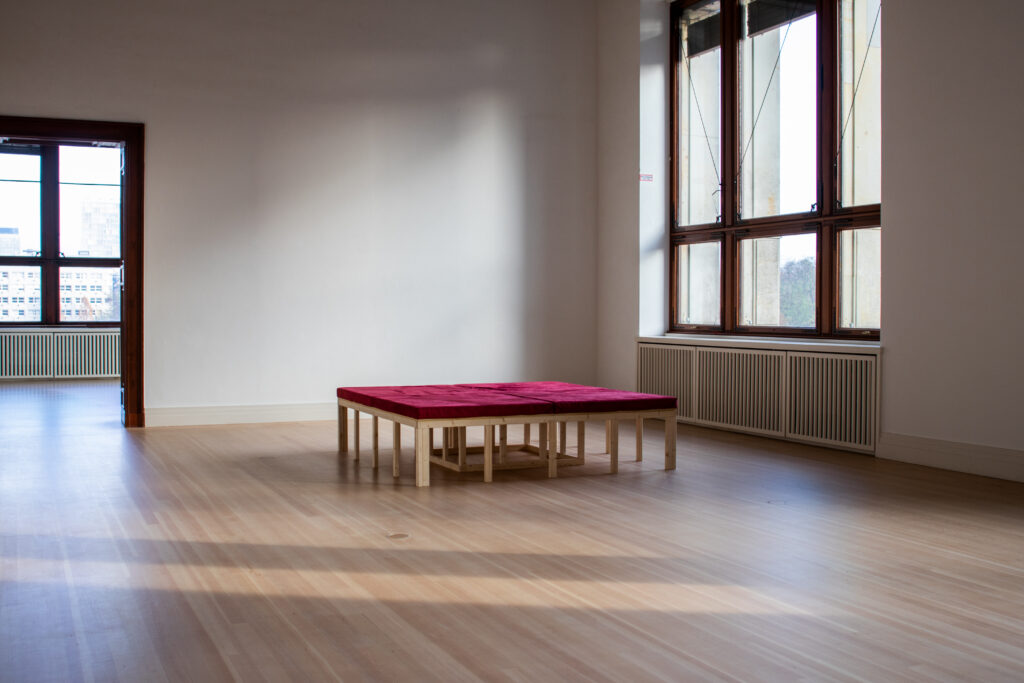
YOYI is the name of the ceremonial song, dance and coming together that is central to Tiwi culture in northern Australia. YOYI! Care, Repair, Heal references this exclamation – an invitation to come together in celebration and mourning.
With works by Pierre Adler, Brook Andrew, Kader Attia, Tosh Basco, Mohamed Bourouissa, Andrea Büttner, Lavkant Chaudhary, Lygia Clark, André Eugène, Guyodo, Artemisia Gentileschi, Johanna Hedva, Jilamara Arts & Crafts Association, Anne Duk Hee Jordan, Eva Kot’átková, Betty Muffler & Maringka Burton, Grace Ndiritu, People’s Archive of Rural India, Outi Pieski, Paula Rego, Tabita Rezaire & Amakaba, Georgia Sagri, Yhonnie Scarce, Reginald Sénatus (Redji), SERAFINE1369 and Wu Tsang
Curated by Brook Andrew, Kader Attia with Giscard Bouchotte, Natasha Ginwala, Bárbara Rodríguez Muñoz, under the curatorial lead of Stephanie Rosenthal in collaboration with SERAFINE1369, In House: Artist in Residence 2021
Georgia Sagri Case_L
↓This book was published by Kunsthalle Friart Fribourg on the occasion of the exhibition:
Georgia Sagri, Case_L, 10 June – 31 July 2022.
Order your copy here.
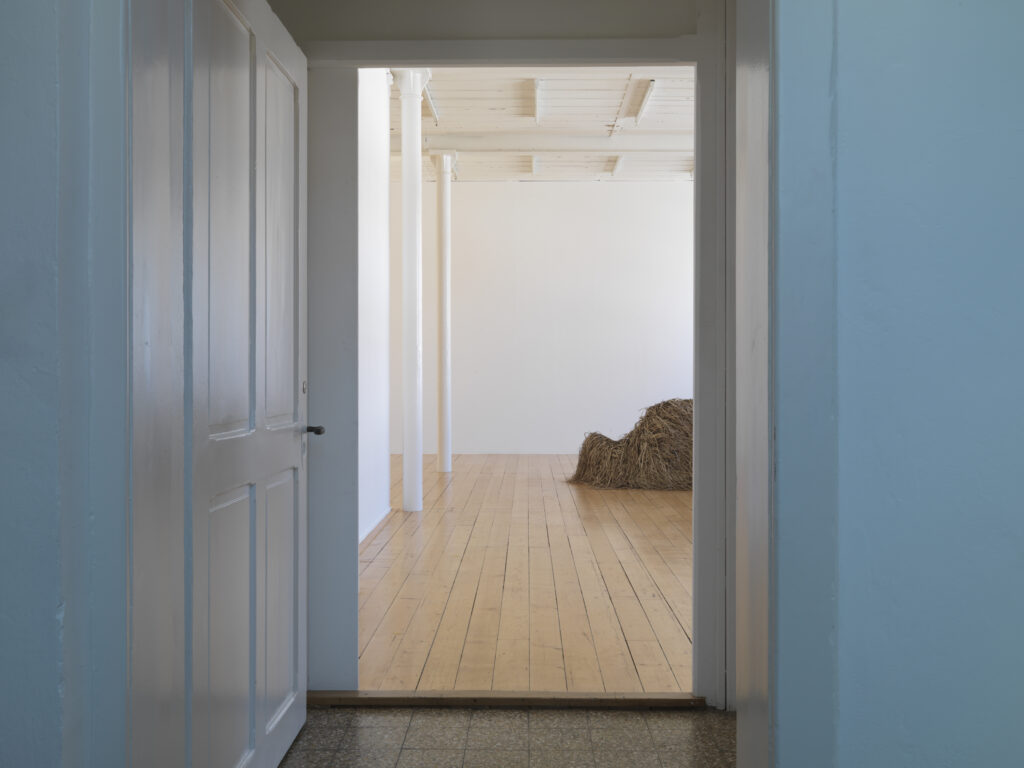
Stage of Recovery at Moderna Museet Malmö
↓APRIL 27 2022
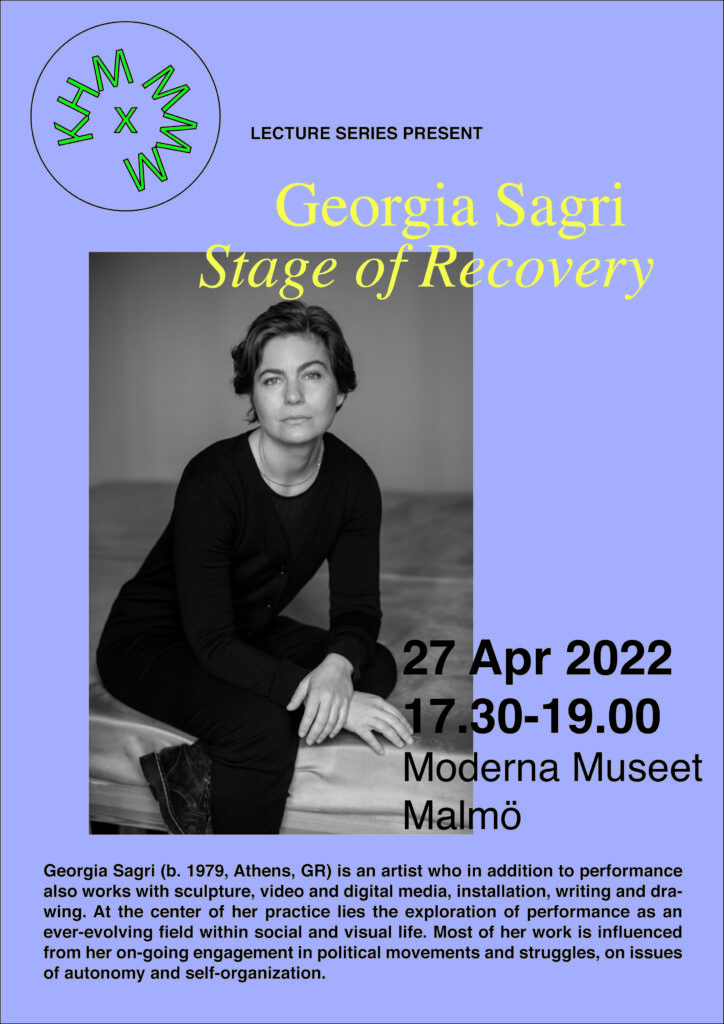
Case_L at Kunsthalle Friart Fribourg
↓JUNE 11 – JULY 31 2022
Curated by Nicolas Brulhart
Une musique intérieure (Conduct, Language, Voice, Inner Ears) at TABAKALERA, San sebastian
↓FEBRUARY 18 – APRIL 24 2022
The Exhibition Une musique intérieure questions our conduct, our language, and our voice as one would the balance of our inner ear; as instruments that stabilise our intimate relationship with the outside world.
The performance of Solo – Nature Study Notes – 1969-2019 [Athens Version] 2021, which marks the beginning of this exhibition in the Basque Country following its presentation in Athens, questions the relationship between individual and collective memory from a new point of view for the Donostia-San Sebastian iteration. The performance, augmented by the presence of other works and artists’ interventions, urges the audience to find a relationship to its own inner music. The itinerancy of this collective work becomes the lever to problematise the framework of its reception. On this occasion, the performance will be interpreted by Georgia Sagri and Delia Gonzalez.
![[object Object]](https://cms.tabakalera.eus/sites/default/files/styles/breakpoint_1920/public/2022-02/22.jpg?itok=SO7VRWiI)
This score was written in Greece using freely available improvisation rites (prose instructions) exercising the open resource principle of the 1960s English collective, The Scratch Orchestra. The outline of the exhibition’s floor plan at the Hot Wheels gallery in Athens, where this work was first exhibited, is superimposed onto the Tabakalera space. Moreover, the clothing designed for the performance is printed with images from the Greek gallery and verbal instructions of the rites by Serapis Maritime. Solo – Nature Study Notes – 1969-2019 [Athens Version] 2021 seeks to interrogate the relationship between the individual and the collective. The score aims to gather the activation of different rites through the clothing worn by one person (a solo performer) who animates the instructions, thereby shifting the construction of the social body onto the somatic formation of the individual. On the other hand, the audience (a collective) is then placed in free circulation around this activation so that the group is more affected in its active listening or passive behaviour.
The exhibition at Tabakalera calls on the scores of composers who were pioneers in their attention to contexts, such as Alvine Lucier (Chambers, 1968), Pauline Oliveros (Deep Listening, 1989), and Milan Adamciak (Floor scores, 1967). As Erik Satie already emphasised in his Musiques d’ameublement (Carrelage phonique, 1917), interiority is colonised by social rules. The exhibition is presented to the public as a chamber concert. Through the artists’ work, its purpose is achieved on the political plane of determinism and in the use of instruments—both as musical instruments and tools of manipulation—played by local artists such as Amable Arias and a new generation of artists such as Eva Barto, Mattin, Matthieu Saladin, and Cally Spooner.
Curated by Pierre Bal-Blanc
Participant artists: Milan Adamčiak, Amable Arias, Eva Barto, Delia Gonzalez, Daniel Grúň, Alvin Lucier, Mattin, Pauline Oliveros, Georgia Sagri, Matthieu Saladin, Erik Satie, Scratch Orchestra, Serapis Maritime, Cally Spooner and Vier5.
SPINE at isdat, Toulouse
↓FEBRUARY 9, 2022
For her workshop SPINE at the institut supérieur des arts et du design de Toulouse, Georgia Sagri will work on the notion of the Stage of Recovery, which is also the title of her recently published book. She will present and develop with the students the tactile forces and her techniques of IASI (recovery). In the training, physical responses, as well as conversations with the students, will further the investigation and the analysis of care, self-recovery, pain and fatigue, exhaustion, anxiety. Georgia Sagri will also organize one-to-one meetings with the students. The assemblage of visual, gestural, and vocal impressions of the accumulated bodily experiences explored simultaneously on a personal and collective level: their chronic pains and their releases will form the backbone, the SPINE, of the resulting final presentation.
Their Mouths would then be filled with Marble at MISC, Athens
↓NOVEMBER 26 2021
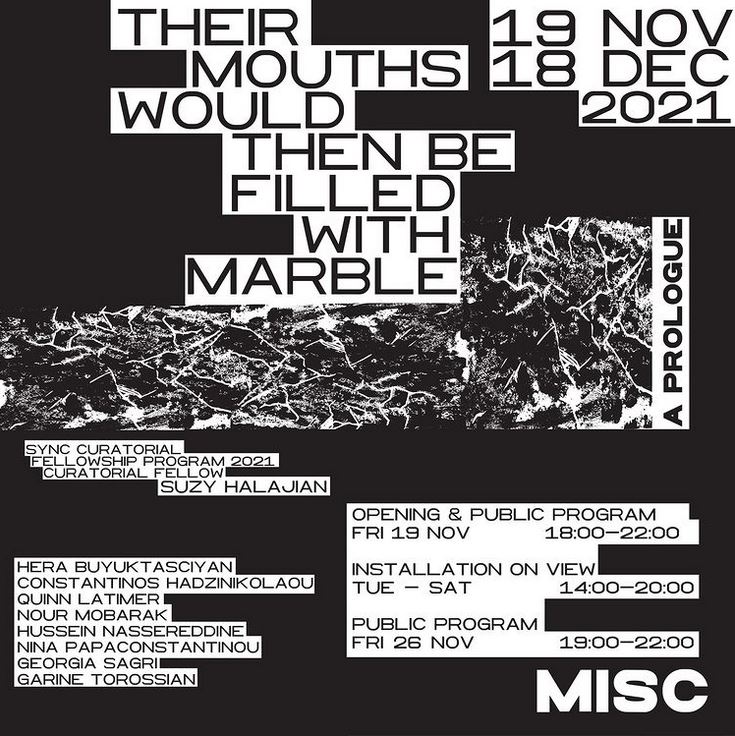
Their mouths would then be filled with marble is a group project that unravels as individual yet interconnected parts at MISC Athens. The collaboration brings together a newly commissioned installation by Hussein Nassereddine, and two public programs which materialize through conversations, performative presentations, and a screening with invited participants. Engaging closely with the artistic scene in Athens through studio visits, the research considers how the exchange of personal recollections makes space for the meeting of divergent and shared histories and literary sources across localities. It reflects on the process-based and collaborative mode of sync residency, and brings together local and international artists to present un-concluded works in progress.
Curated by Suzy Halajian.
Performative Transcending Somatic Dinner
↓NOVEMBER 3, 2021
There are monsters in the basement
and birds have fled the skies,
Enchanted heads put on their makeup
and fragments of pipes crawl up the walls.
All friends put their costumes on,
The sword is in the stone,
the table set and the guests all invited…
The reception will be brilliant
Virtually, we conjure space in the digital realms,
relying on imagination and archival evidence
as sustaining forces to deliver a new world. We offer each other our own creations, oral histories and knowledge as a balm for new wounds. We come together, a unifying blossom against a crisis to move towards a common cause. what will the ground be made of today, cement, earth or quicksand?
the days are delirious and no longer have a name. bad habits like staying in and rejecting invitations have become prescribed. there is a water drought. were we ever fluid?
Curated by Lydia Antoniou and George Bekirakis with the kind support of NEON Organization for Culture and Development.
Α dinner with works by Andreas Angelidakis, Eleni Bagaki, Savvas Christodoulides, Evi Kalogiropoulou, Katerina Komianou, Eva Papamargariti, Olga Miliaresi-Phoca, Maria Papadimitriou, Panos Papadopoulos, Vasilis Papageorgiou, Dionysis Kavallieratos, Irini Miga, Angelo Plessaas, Georgia Sagri, Socratis Socratous, Eva Stefani, Sofia Stevi, Valinia Svoronou, Thanasis Totsikas, Amalia Vekri, Evgenia Vereli.
I GOT UP at gb agency, Paris
↓OCTOBER – NOVEMBER 2021
The exhibition entitled I GOT UP activates the formula used by the conceptual artist On Kawara in a series he began on May 10, 1968 and completed twelve years later, in 1979 following the accidental theft of his notebooks and the ink pad used to produce them.
The I GOT UP series consists of sending a postcard to different recipients every day, indicating with an ink stamp the exact date and time of the start of the artist’s daily activity. This series, produced over more than a decade, should be understood as a work of which only fragments are available, like one of the postcards addressed to the artist Dan Graham, presented in this exhibition.
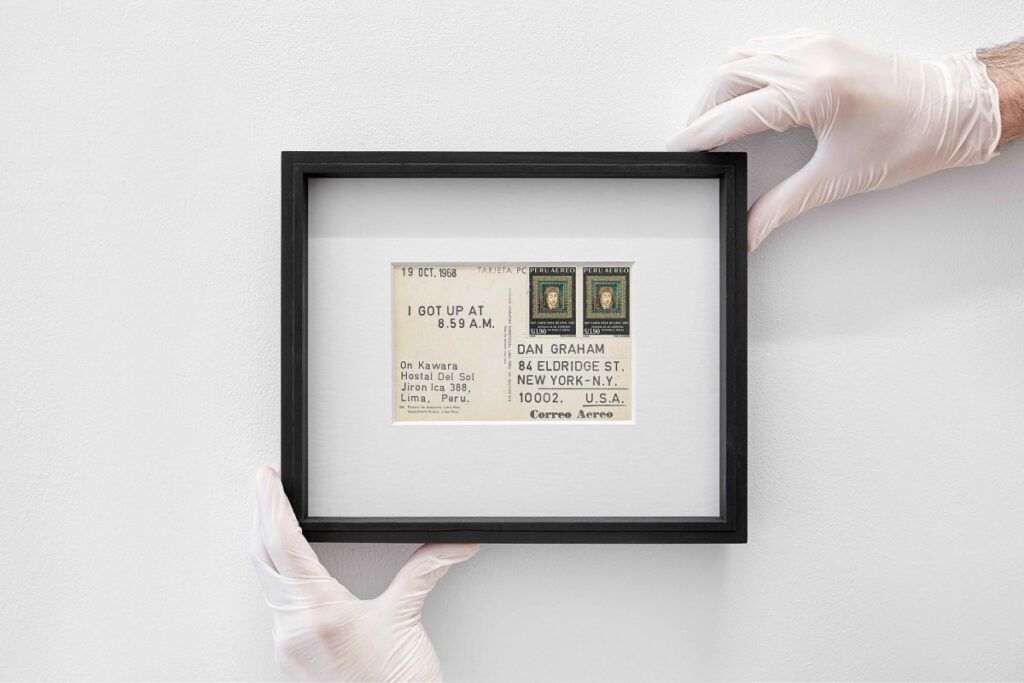
The opening performance of the exhibition uses the same date and time as that written on the postcard sent more than half a century ago in 1968 from Lima in Peru to the American artist in New York in the United States.
The exhibition will be activated on the morning of October 19, 2021 at 8:59 am for an exchange in the presence of a person who will have spent the previous night in a bed installed in the gallery. Access to this room, which usually serves as a showroom, is not available from the public entrance to the gallery, but from the private residents’ door of the building, Intercom Toni Smit, at the same number: 18 rue des quatre-fils.
The exhibition, apparently presented in a domestic space, but concretely situated within the perimeter of the ground plan of the commercial gallery, thus underlines the disappearance of all privacy. Works produced at the same time as that of On Kawara or more recently by artists of different generations and origins echoing this series which has become a canon of conceptual art will be exhibited, thus forming a constellation which anticipates or relates to the current condition of our societies of control
Curated by Pierre Bal-Blanc
With among others Ei Arakawa, Eva Barto, Robert Breer, Marie Cool Fabio Balducci, Thibaud Croisy, Omer Fast, Serge Garcia and Terre Thaemlitz, Ryan Gander, Dan Graham, Friedl Von Gröller, Nilbar Güres, Mauricio Guillén, Tirdad Hashemi, On Kawara, Pierre Klossowski, John Knight, Július Koller, Guillaume Maraud, Pratchaya Phinthong, Marianne Marić, Georgia Sagri, Serapis Maritime, Pak Sheung Chuen, Cally Spooner, Vier5, Jeff Wall, Lois Weinberger, Marina Xenofontos.
” ALETHEIA , ” at Central Fine
↓SEPTEMBER 25 – OCTOBER 19, 2021
Disclosure: This presentation does not address the concept of Aletheia(1 ) as truth per-se, but rather as an unveiling of something that appears once filters, language, and voices are allowed to voice the ID. Clashes are to be expected. With every space, the calligram (2) announces a sense of pause and a threshold.
As one unzipped something, what was unveiled remained, inevitably, in flux. What was revealed wasn’t the material or the object (naked now), but rather, the tension.
Works by: Myrlande Constant, José Delgado Zuñiga, Chemu Ng’ok, Georgia Sagri, Constanza Schaffner, Diego Singh, Kyle Thurman
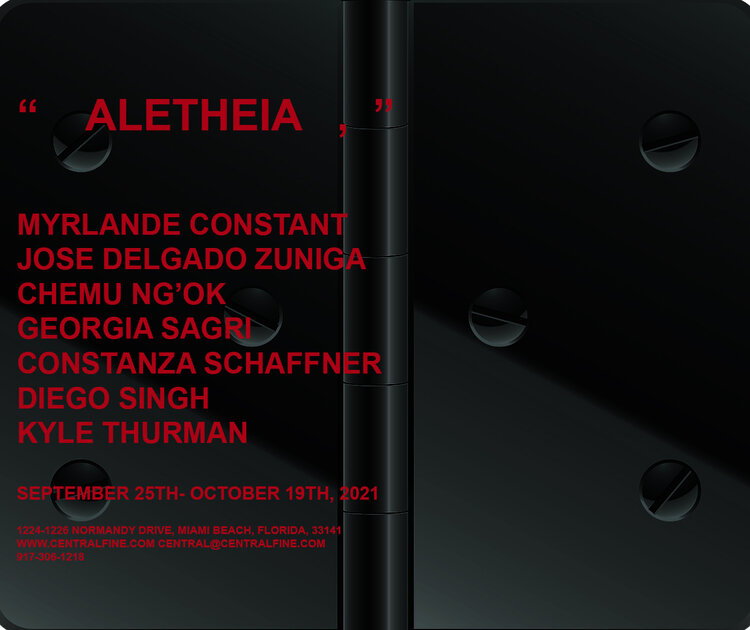
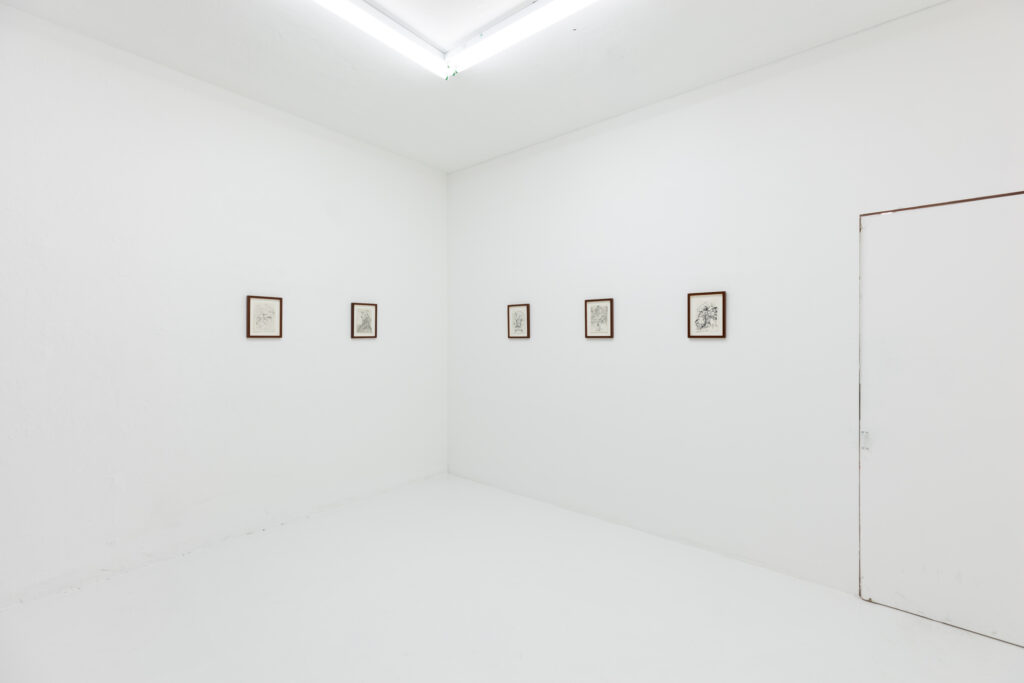
Almanac Talks – Praxis: art, ideas and communities
↓JUNE 2021
In the second episode of Almanac Talks – Praxis: art, ideas and communities, Francesco Tenaglia is in conversation with activist, artist and educator Georgia Sagri.
Almanac Talks: Praxis — art, ideas and communities is a series of podcast episodes organised and hosted by art critic and curator Francesco Tenaglia which explores curatorial and artistic practices focused not only on exhibition making, but also on public programs, workshops, reading groups, civic activism and other forms of community engagement, as well as emerging theoretical and sociopolitical issues.
I GOT UP at HOT WHEELS ATHENS
↓JUNE – AUGUST 2021
The exhibition entitled – I GOT UP – adopts the formula used by the conceptual artist On Kawara in a series that he began on May 10, 1968 and completed twelve years later in 1979. This work, from which four pieces are exhibited here, consists of sending a postcard to different recipients every day, indicating the exact time at which the artist’s daily activity began with an ink stamp.
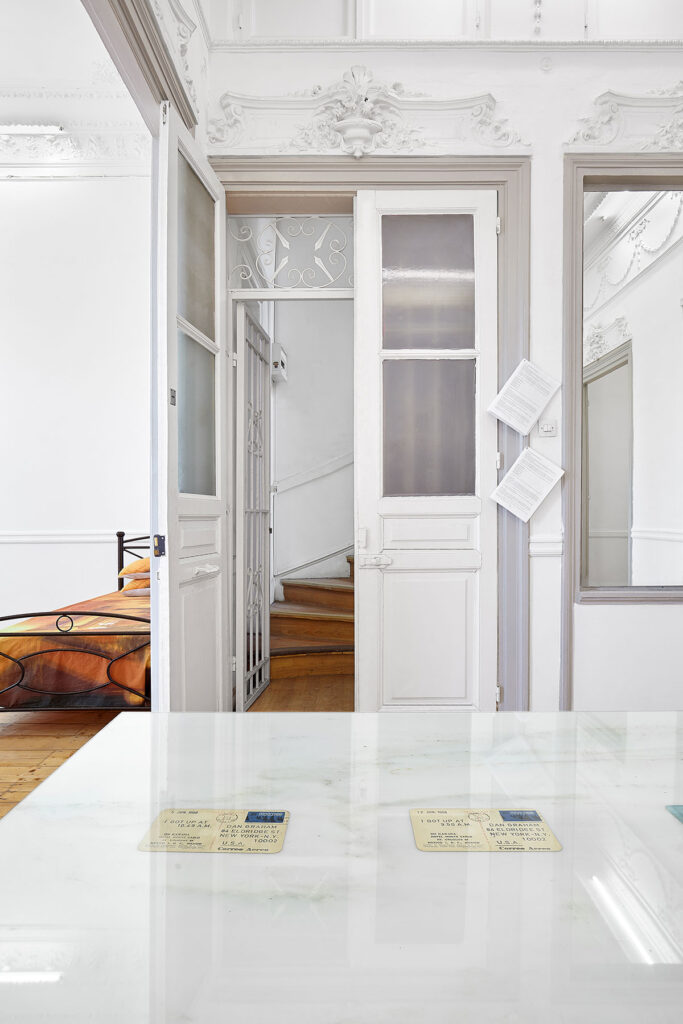
This exhibition will also be the setting for the world premiere activation on June 11, 2021 (followed by June 18 and 25) by Georgia Sagri, Delia Gonzalez, and Serapis Maritime of the latest score “Solo – Nature Study Notes – 1969-2019 [Athens Version] 2021” written by Pierre Bal-Blanc from the rites (Nature Study Notes, 1969) of the Scratch Orchestra.
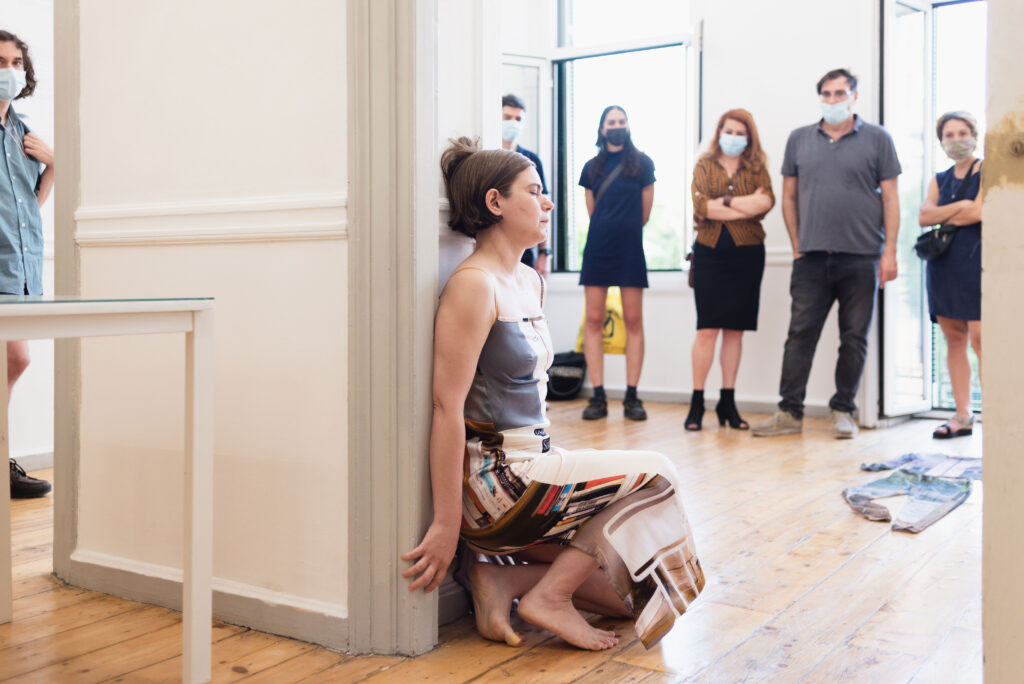
Curated By Pierre Bal-Blanc
With works and performances by
Sophie Calle, Delia Gonzalez, Dan Graham, On Kawara, Georgia Sagri, Scratch Orchestra, Serapis Maritime
“Anti-Structure” at DESTE
↓JUNE – OCTOBER 2021
Featured at the Group Exhibition “Anti-Structure”, DESTE foundation
Taking as its starting point an immersive installation with works by Urs Fischer and placing it in dialogue with the work of twenty-one Greek and Cypriot artists of various generations and modalities, Anti-Structure explores the far-fetched realm of fine lines between order and chaos, stasis and flux, structure and fragility.
Stage of Recovery
↓By Georgia Sagri, published by Divided Publishing on 6 May 2021
Order your copy here
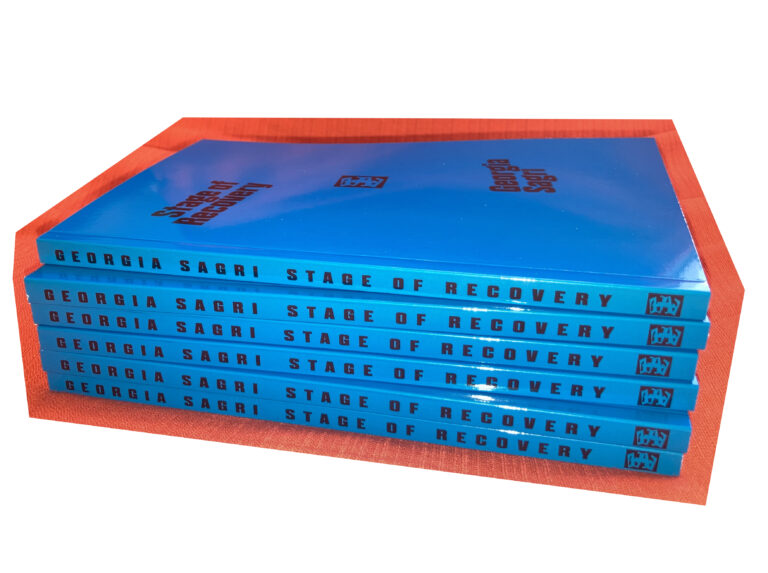
“No one talks about the present. There is one, and I feel it now with you. It is my only weapon.’
Georgia Sagri
Close to spiritual anarchism, Georgia Sagri’s writing happens in the heat of negotiation. Starting in the months leading up to the occupation of Zuccotti Park in 2011, which became the movement for people’s self-governance known as Occupy, this book carries the energy and commitment of open struggle, direct address, self-organisation and public assembly. It is a critique of representation and its implicit oblivion, told through a decade of artistic and activist practice. The writing is a mode of recovery, it is pre-content shared to encourage open processes in art, thinking and action.
Deep cut at The Breeder Skin
↓JUNE 2020
Following the first lockdown The Breeder gallery chose to exhibit Georgia Sagri’s emblematic work Deep Cut, in the façade of the building on Iasonos street, in the public realm.
Deep Cut depicts a hyper-realistic representation of a cut at the moment of bleeding in an oversized dimension. Is the bleeding cut on the artist or are the walls bleeding? Does the work imply the audience is hurt, the city and the country? Would it be the result of the pandemic, the economic crisis, or does it derive from the mere fact of our existence? How deep is a cut? Is it ever completely cured or does it leave its mark forever? Does a wound return as a reminder or does it vanish with the help of plastic surgery? The means we use to take care of the unstoppable bleeding cut, the ways we recover from its repetitive and unsurpassed state, defines our present and our future.
The size of the wound and its socio-political aspects surpass everyday facts and exposes us to an uncertain tomorrow. The Deep Cut is the break of the tissue, it is the wound of nature, its silent mourning. The wound of a divided society is what cuts up something superficially connected and seemingly unbreakable and reveals the chaotic gap, spiritual or existential, realistic or cultural, that defines contemporary societies.
GEORGIA SAGRI GEORGIA SAGRI and I
↓Published by Sternberg Press
Order your copy here
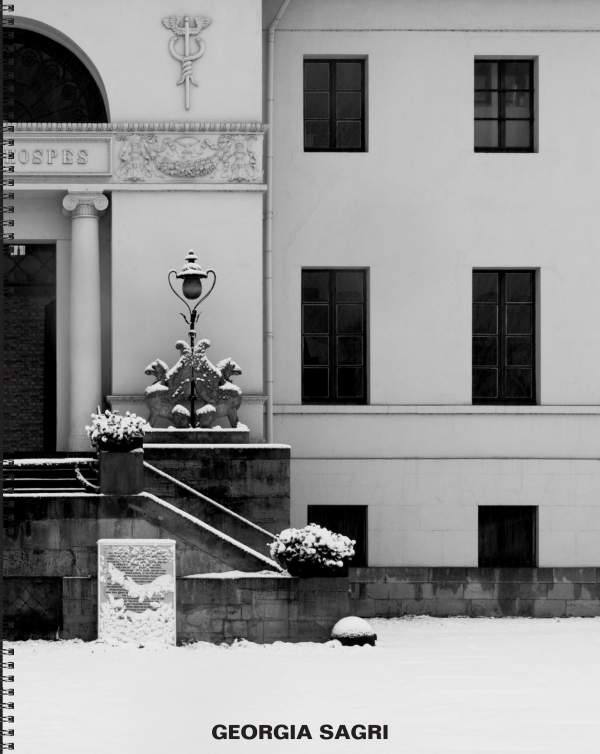
The catalogue GEORGIA SAGRI GEORGIA SAGRI and I is published on the occasion of the eponymous solo exhibitions “GEORGIA SAGRI GEORGIA SAGRI” at Kunstverein Braunschweig, December 2017–February 2018, and “GEORGIA SAGRI and I” at Portikus, Frankfurt am Main, April–June 2018. As her first comprehensive publication, this catalogue surveys the multi-facetted oeuvre of the Greek artist Georgia Sagri. As the title of this book suggests, the staged objects Sagri produces are doubled modules, where each I or self can be “cross-eyed.” This effect, often produced theatrically, reorders the collective gaze to be subverted through a “catastrophe of emotions.” Across performance, video work, and sculpture, Sagri navigates the murky relationships between the artist’s body and her body of work, subjectivity and persona, original and reproduction with equal parts humor and severity.
Edited by Christina Lehnert, Philippe Pirotte
Texts by Sotirios Bahtsetzis, Silvia Federici, Bettina Funcke, Daniel Horn, Ruba Katrib, John Kelsey, Christina Lehnert, Diego Singh, Stephen Squibb
Research Practice IASI
↓(Recovery)
The research practice for IASI includes private and anonymous one-to-one sessions with individual participants, part of the research into self-care and recovery – a 10 year long body of research which includes voice tuning, breathing exercises and movement techniques.
This new chapter of research develops in overlapping phases in three allied art institutions and three cities – Mimosa House (London), TAVROS (Athens), De Appel (Amsterdam) and at her studio ‘Υλη[matter]HYLE, where case studies were showcased, taking shape in the form of performances, objects, drawings and writings by the artist.
If you are interested in booking a private one-to-one session, for the next round of IASI, please contact georgiasagristudio@gmail.com
Mimosa House, London
“Georgia Sagri’s ‘IASI’ brings a unique and new opportunity to Mimosa House: to explore the impact of artistic practice on the public, as well as to ask wider questions about artist labour, self-care and pathologies of our time. ‘IASI’ is an experiment in establishing in-depth collaboration with individual members of the audience, through a process of sharing knowledge and bodily practice which have a long lasting effect beyond the exhibition’s timeframe and space.”
Daria Khan, curator and Mimosa House founder
Tavros, Athens
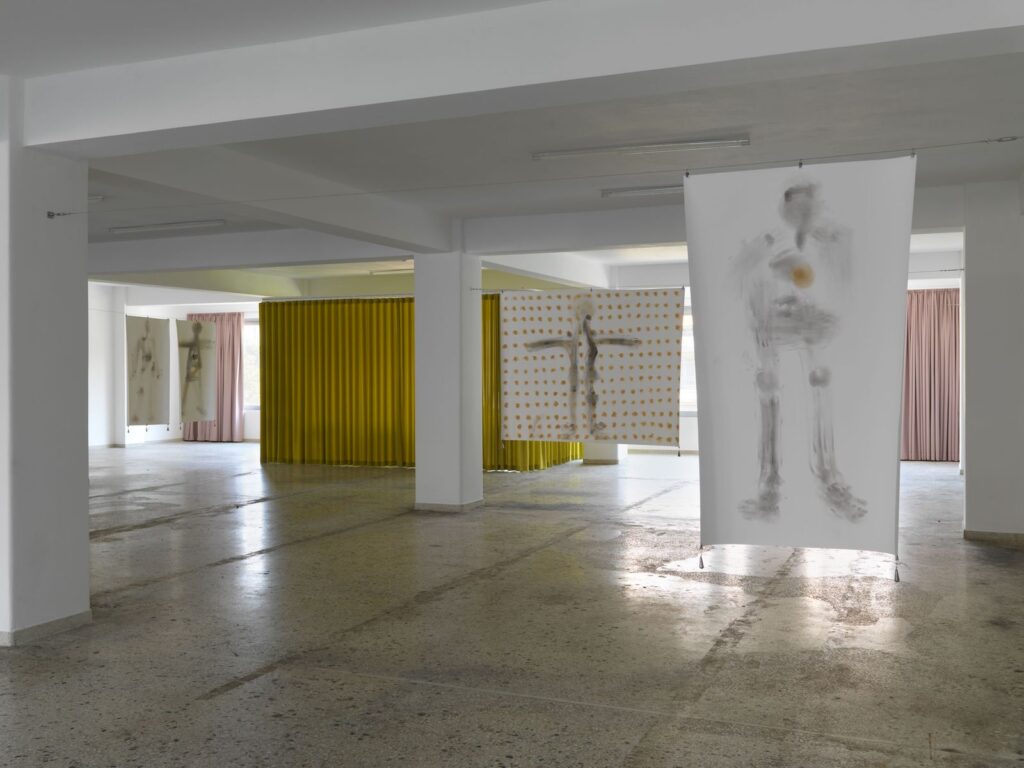
“It is this prescient demand for human contact and for a new social contract that brings IASI here to TAVROS. Reflecting our belief that art might no longer concern purely material exchange but will return to other value systems that use action to counter worldly and somatic alienation and that our bodies still have the capacity to rewire, release and be receptive to care and love. IASI provides the basis for a discussion on bodies (as celestial as they are mundane), stillness (through abstention) and voice (as the precondition for political beings). Our pain and subjectivity is removed from the world of things but as it surfaces collectively we have the chance to start on a process of recovery and perhaps a new chapter of living.”
Source: Exhibition IASI at tavros space
E-flux – Locus athens: IASI by Georgia Sagri
de Appel, Amsterdam
You will find a plethora of photographs, correspondences, official communiqués and other records inside three large flat file cabinets, and also on the windows which span the east and west walls of the Aula. Note that the photographic film, especially as it is distributed on the windows by the stage, functions as a ‘curtain’ to protect the privacy of IASI sessions from the outside gaze. These materials raise key questions, which we hope to explore with everyone who attends. What does it mean to say that “the artist is the spine of society,” as Saskia Bos asserts through her 1994 exhibition The Spine? Hearing this as we installed, Georgia Sagri responds, “then the diaphragm is the horizon.” With her spine straight, she points to the muscle which expands the ribcage and lungs ensuring the life-giving function of breath as a cipher and instrument of much needed social healing.
Source: DeAppel
